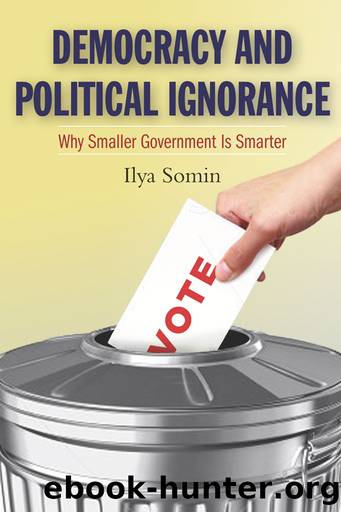Democracy and Political Ignorance by Somin Ilya

Author:Somin, Ilya [Somin, Ilya]
Language: eng
Format: epub
Publisher: Stanford University Press
Published: 2013-12-14T16:00:00+00:00
CHAPTER SIX
Political Ignorance and Judicial Review
[J]udicial review is a deviant institution in the American democracy.
âALEXANDER BICKEL1
LIMITING AND DECENTRALIZING government power can mitigate the problem of political ignorance. The institution of judicial review can also help with that task. By constraining the power of the elected branches of government, judicial review can reduce the complexity of the task facing voters, and also help empower citizens to âvote with their feet.â Recognition of these potential advantages of judicial review also weakens the force of one of the main traditional objections to judicial invalidation of legislation: the so-called âcountermajoritarian difficulty.â
The countermajoritarian difficulty has long been considered the most fundamental issue in American constitutional law.2 It is âthe central obsession of modern constitutional scholarship.â3 As legal scholar Alexander Bickel famously put it in his classic work The Least Dangerous Branch,4 âthe root difficulty is that judicial review is a counter-majoritarian force in our system.â5 For Bickel and innumerable later writers, judicial review was an anomaly because it enabled an unelected judiciary to override the majoritarian will of the people represented by elected legislatures.6 Since Bickel published The Least Dangerous Branch in 1962, a vast academic literature has addressed the countermajoritarian difficulty.7
Both conservative and liberal legal scholars have advocated the abolition or severe restriction of judicial review to prevent an unelected institution from overriding the will of a democratic majority.8 According to Robert Bork, the most prominent conservative critic of judicial review, the judicial invalidation of legislation is objectionable because it creates ânew disabilities for democratic government.â9 Neal Katyal, a leading liberal constitutional law scholar, echoes Borkâs concern, expressing his fear that â[f]or those worried about the vigor of popular rule in America, there is much to fear from judicial interpretation [of the Constitution].â10
The idea of the countermajoritarian difficulty rests on the premise that laws enacted by legislatures reflect the will of electoral majorities, which in turn relies on the assumption that the latter possess sufficient political knowledge to control what their representatives do. Yet most of the vast literature on this subject ignores the relevance of political ignorance.
An understanding of the depth and pervasiveness of voter ignorance should lead us to reconsider the countermajoritarian difficulty in several fundamental ways. If most of the electorate has little or no information on politics and government policy, it is likely that legislative output does not represent the will of the majority in the way that Bickel and later theorists assumed. Judicial invalidation of such legislation is not nearly as âcountermajoritarianâ as generally supposed. This important point is only the first of several important implications for voter ignorance on the central question of constitutional theory.
This chapter does not provide a comprehensive solution to the countermajoritarian difficulty or address the full range of issues raised in the prior scholarly literature on the subject. It also does not address the full range of interactions between judicial decisions, government policy, and public opinion; for example, it does not take into account the danger that overly aggressive judicial review might undermine the judiciaryâs legitimacy in the eyes of the public.
Download
This site does not store any files on its server. We only index and link to content provided by other sites. Please contact the content providers to delete copyright contents if any and email us, we'll remove relevant links or contents immediately.
| Elections & Political Process | Ideologies & Doctrines |
| International & World Politics | Political Science |
| Public Affairs & Policy | Specific Topics |
| United States |
The Secret History by Donna Tartt(18973)
The Social Justice Warrior Handbook by Lisa De Pasquale(12172)
Thirteen Reasons Why by Jay Asher(8858)
This Is How You Lose Her by Junot Diaz(6845)
Weapons of Math Destruction by Cathy O'Neil(6229)
Zero to One by Peter Thiel(5743)
Beartown by Fredrik Backman(5691)
The Myth of the Strong Leader by Archie Brown(5474)
The Fire Next Time by James Baldwin(5398)
How Democracies Die by Steven Levitsky & Daniel Ziblatt(5183)
Promise Me, Dad by Joe Biden(5120)
Stone's Rules by Roger Stone(5060)
A Higher Loyalty: Truth, Lies, and Leadership by James Comey(4923)
100 Deadly Skills by Clint Emerson(4888)
Rise and Kill First by Ronen Bergman(4747)
Secrecy World by Jake Bernstein(4712)
The David Icke Guide to the Global Conspiracy (and how to end it) by David Icke(4664)
The Farm by Tom Rob Smith(4475)
The Doomsday Machine by Daniel Ellsberg(4463)
